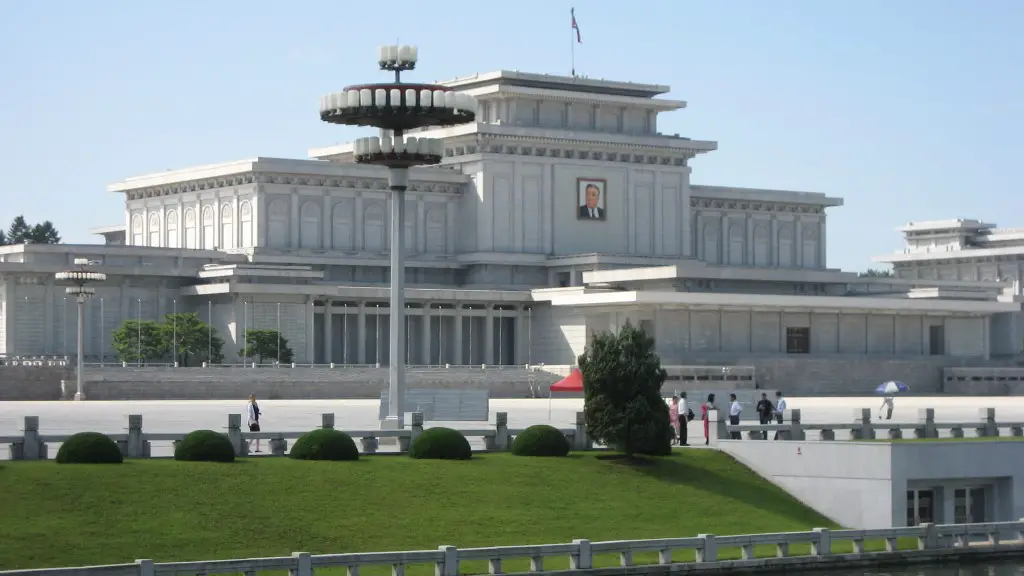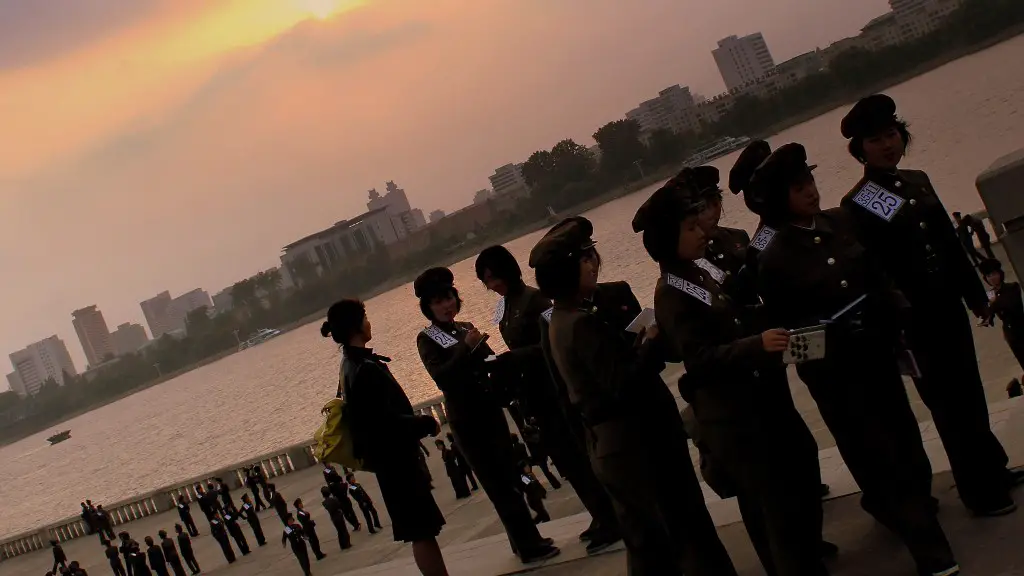History of North Korean Backers
North Korea, officially the Democratic People’s Republic of Korea (DPRK), has been subject to controversy and condemnation over its human rights record, and has been a thorn in the side of the international community since its founding in 1948. But what are the powers who back North Korea’s regime? The DPRK, who is known to put the wants of the regime and its leader, before its people, has supporters around the globe willing to turn a blind eye to its human rights violations in favour of their own interests.
North Korea has, however, had some support in the past. This includes the Soviet Union, which provided protection and financial support, as well as China, who provides much needed aid in the form of food and fuel. During the Cold War, China viewed the DPRK’s brand of communism as an essential puppet state to maintain a buffer zone between it, and the American allied states of South Korea and Japan.
Today, North Korea has a small and limited economy, but relies on China for 80% of its trade, and Russia for 5%. They also export arms to countries like Burma, Syria and Iran in exchange for support. North Korean officials often travel around the world in search of arms and money, particularly to countries with whom they share a solid relationship with, such as Russia and China.
China and Russia have maintained ties with North Korea in recent years, primarily to encourage more effective means of arms control and de-nuclearization. But most notably to prevent a refugee influx as a result of regime unfavourable regime changes. Both countries also benefit financially, with China benefitting from cheap North Korean labour and both countries engaging in mutual trade agreements.
Although nations such as France, Canada, the UK and USA have implemented diplomatic strategies in order to prompt North Korea to end its state sponsored human rights abuses, it has not been successful. Human Rights Watch reveal that the North Korean regime has continuously backed its citizens’ subjugation, with people not even having the right to publicly criticize their leader.
Despite the US intervening in the Korean War, most of their action has been concentrated on preventative measures, for which support from China and Russia is essential. Strict UN sanctions, which include an arms embargo, has been imposed on North Korea since 2006 in retaliation for numerous violations, including missile launches and nuclear program tests.
What Has it Lead To
Although the sanctions have had an economic impact by limiting the regime’s activities, very little in the way of slowing down the nation’s arms programme has been achieved. Despite what appears to be political reluctance from Russia and China to isolate North Korea, there is a lot of scepticism about how much influence either of these countries have over its rogue state.
The current North Korean leader, Kim Jong Un, has been able to resist international sanctions, most likely due to his existing power networks. Political commentators also speculate that support from China allows Kim Jong Un to conduct his activities more confidently, knowing that its closest ally will do very little to intervene.
Unstable political relationships in the region, such as the never ending spat between China and Japan, also play a huge factor in the support of North Korea. Japan view North Korea as a place of military threat, with the DPRK previously shooting rockets over its country, yet with international support still being unable to reign in theKim regime, they have had to resort to more unconventional tactics, such as economic sanctions and other forms of economic isolation to try and tackle the human rights problem.
Overall, North Korea’s support continues to be a complicated and intricate process. However, despite the current stalemate between its supporters and international condemnation, change is slow but possible and it’s going to take a multi-level, multi-stakeholder approach to truly open North Korea up to the world.
Political Pressure from America
The US has relentlessly pursued North Korea since the Korean War and has since increased the pressure on the North Korean regime. US Department of State have expressed dismay at the closure of a liaison office in DPRK, which was used in diplomatic negotiations. The US government have also expressed their intent to bring Kim Jong Un to justice, should evidence be sufficient, which has been a major impediment to any diplomatic negotiations with North Korea.
The US have also stated an intention to increase pressure on China and Russia, who have reportedly been providing North Korea with economic aid and military supplies despite UN sanctions. US leaders have also written open letters to the leaders of the two countries, urging them to play a part in isolating and weakening the Kim regime.
However, world leaders like Japan’s Shinzo Abe and South Korea’s Moon Jae-in have been particularly vocal about their opinions, with all three countries advocating for stronger diplomatic measures to be taken against North Korea. This includes shouting down Kim Jong Un’s inflammatory rhetoric, coupled with the release of political prisoners, if the Kim regime ever sought to engage in meaningful dialogue.
The US has also recently withdrawn its troops from South Korea, which could serve as an example of the power it can wield on its North Korean allies, as well as southern neighbours. Its interpretation of the security alliance between the two countries also serves as a reminder of the tense political climate between the two regions and the US’ commitment to defend its allies.
International Condemnation
Outside of the supporting nations, most countries have shied away from the notion of backing North Korea, primarily due to its volatile human rights record. In 2017, the UN Human Rights Council found that North Korea had systematically violated their citizens’ basic rights, with reported overcrowded prison camps, forced labour, torture, hunger and even starvation form coercive measures used by the regime. Those under the direct control of North Korea have no say in the running of the country and are routinely persecuted for simply existing.
The UN has since passed multiple resolutions denouncing North Korea’s human rights abuses and has also proposed establishing an independent commission to assist in the resolution of the situation. The UN have also expressed a financial interest in trying to combat the DPRK’s nuclear weapons program, and in 2017, the UN Security Council unanimously adopted the harshest sanctions package ever implemented on North Korea.
Despite this, Russia and China have repeatedly ignored the UN Security Council’s requests to disable the Kim regime, primarily due to their own self interests. This is evidenced by China’s refusal to stop providing economic and military aid, as well as their rhetorical support in international forums.
The European Union (EU) have also voiced their condemnation of North Korea’s human rights record, with many EU officials calling for an independent investigations into the issue, as well as sanctions aimed at Members of the Kim’s inner circle. The EU have also imposed travel bans on high-ranking members of the Kim regime, as well as an embargo on coal exports and other luxury goods.
Acceptance or Support?
In spite of the abysmal human rights record of North Korea and fierce international condemnation, some may argue that it’s support from Russia and China that keeps North Korea in power. They have provided access to markets, international legitimacy and economic assistance, and despite being party to UN resolutions and outspoken objections to DPRK, they have yet to take bold action to put an end to the tyranny.
Political analysts have speculated that these nations are not planning to take any drastic measures, as any moves towards a regime change may end in military and economic chaos. Russia and China therefore see the Kim regime as a necessary evil, and a tool of international diplomacy to be used when needed, instead of a real threat to the regional order.
But it’s not only international bodies taking action against North Korea. Grassroots campaigns, such as North Korea Freedom Coalition, are actively pushing for sanctions to be imposed on North Korean entities in order to hold them accountable for crimes against humanity and for the US government to provide support for North Korean defectors.
As such, the question arises – is acceptance of the Kim regime tacit approval? Is the lack of action by some nations to prevent human rights abuses by North Korea an example of “turning a blind eye”? Or could it be that the DPRK’s international backers, while displeased with the brutality of the regime, do not feel strong enough to push for meaningful change.
The Claim to Unification
While North Korea’s supporters back the regime to some extent, they have not shied away from peace talks with the South Korean regime, who has recently emerged as the leading figure in the North’s claim for unification. North Korea’s foreign ties, both official and unofficial, were used as a tool for international relations, with Kim Jong Un’s government working to foster strong ties with a variety of countries, including Russia and China, as well as a number of countries in Africa and Asia.
Kim Jong Un has even personally met with the US officials, including US President Donald Trump in 2018, to discuss the North’s nuclear weapons and the reunification of Korea. This stems from the fact that the North has the capacity to rely on China and Russia, while still maintaining its independence on the international stage.
No matter the reasons behind international support for the North Korean regime, one undeniable fact is that their claim to unification will always be tenuous. The UN have also noted that the human rights situation in the country must be addressed in order for peace and reunification to be successful.
International attention must also be paid to the refugee situation, as the number of North Korea citizens fleeing their country has been on the rise in recent years, due to the deteriorating living conditions. The UN High Commissioner for Refugees has repeatedly urged the international community to grant asylum rights to North Korean defectors, in order for them to build a new life in safety.
What Are the Primary Motivations?
The motivations for backing North Korea are multi-faceted. Russia and China feel that it ensures their influence in the region, while guaranteeing their own power and interests. For others, solidarity and upholding the existing order is a key goal. North Korea’s isolationist stance is also seen as an attractive asset, allowing it to develop its own military capabilities, such as its nuclear weapons program and missile technology, unhindered.
North Korea’s supporters have also used the nation to gain favourable trade agreements and access to labour markets, as well as stabilising their borders. Although some international players vocally oppose the DPRK, it remains a fact that none of the international actors have put forward a proposal to back serious measures that would actually help to improve the human rights situation.
In this regard, any action taken must involve multi-level, multi-stakeholder cooperation, with the ultimate goal of bringing about peace, security and stability to the region. Only through this approach can North Korea truly open up to the world and become respected, rather than the isolated and unpredictable nation it currently is





